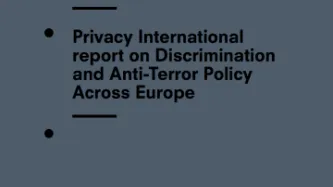Search
Content type: News & Analysis
Privacy International has joined forces with dozens of other human rights and civil liberties organizations around the world to ask the European Parliament to reject a Directive that would seriously compromise personal freedom in the EU. Below is the text of the letter to Members of the European Parliament, and the pdf is also available.
To all Members of the European Parliament
We the undersigned are calling on you to reject the 'Directive of the European Parliament and the Council…
Content type: Report
Race relations across European states are usually far from ideal. However in law, European countries appear to grant Europeans ideal protections against discrimination. There are mounting tensions with ethnic and minority communities in countless European countries, with particular suspicion and aggression pointed towards the Roma people, Travellers, Northern Africans, Turks, Jehovah’s Witnesses, and people of Islamic and other faiths. Increasingly these groups are finding safe havens behind…
Content type: News & Analysis
The UK Presidency's first formal report, entitled 'Liberty and Security: Striking the Right Balance', was released today. It argues the case for new and expansive policies on communications surveillance, biometrics, travel surveillance, and CCTV. In fact, it promises to take UK policy failures to the European level.
Communications data retention
Despite having only a voluntary framework in UK law, the UK Presidency of the EU is pursuing mandatory data retention in a framework decision…
Content type: News & Analysis
The below letter was addresses to UK Prime Minister Tony Blair, Viviane Reding (Commissioner for Information Society and Media) and Franco Frattini (Vice President and Commissioner for Justice, Freedom and Security).
Your excellencies,
On behalf of European Digital Rights and Privacy International we would like to express our sadness and anger at the terrorist attacks in London on 7 July. We understand the difficulty of ensuring the daily safety of all citizens and residents…
Content type: News & Analysis
In a tipping of the hat to the Americans, the UK is set to establish the largest border surveillance programme to date. The new programme will involve the collection of biometrics on visitors to the UK, the generation of vast information stores on all Britons and visitors, and a profiling system to identify those worthy of further scrutiny.
This programme does not merely apply to combatting terrorism however; it is for use for general policing matters.
We have archived the 'partial'…
Content type: Report
This report investigates the probable effect of the proposed UK national Identity Card system on people who are marginalised, who suffer social disadvantage or exclusion, and those who are disabled. The work focuses on the biometrics element of the government’s proposals (specifically facial recognition, ngerprinting and iris scanning).
The Report provides a specific assessment of the recently published biometrics trial conducted by the UK Passport Service (UKPS), and compares these…
Content type: Report
This report investigates the probable effect of the proposed UK national Identity Card system on people who are marginalised, who suffer social disadvantage or exclusion, and those who are disabled. The work focuses on the biometrics element of the government’s proposals (specifically facial recognition, fingerprinting and iris scanning).
Content type: News & Analysis
In a move that mimics the U.S. fingerprinting policy under the VISIT programme, the European Commission has adopted a proposal for a regulation that would create a central database for all visa applicants fingerprints and photos. Regulation available on the Europa website.
In a somewhat positive turn, it is important to note that the retention period of this data is only five years, compared to 100 years in the U.S. Relevant excerpts include:
To ensure exact verification and…







